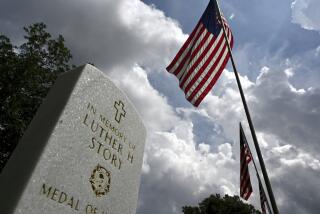WWII soldier won Medal of Honor
- Share via
Alton W. Knappenberger, a Pennsylvania farm laborer who received the Medal of Honor after using his exceptional marksmanship to hold off two German infantry companies near Rome during World War II, died June 9 at Pottstown, Pa., Memorial Medical Center. He was 84 and had suffered five heart attacks over the last 30 years.
Knappenberger single-handedly disrupted a German attack Feb. 1, 1944, near Cisterna di Littoria, a market town with a medieval castle about 30 miles from enemy-held Rome. Armed with a Browning Automatic Rifle, Knappenberger was credited with killing 60 German soldiers over a two-hour span that day.
An American general called him a “one-man army.”
He was awarded the Medal of Honor, the military’s highest award for valor, for his skill with the rifle, but he dismissed the publicity that came with the decoration as “the worst darn ordeal” of the war.
Knappenberger honed his riflery skills in rural eastern Pennsylvania during the Depression, when eating often depended on his hunting ability.
He was extremely shy about discussing the medal or the events leading to it.
“I was scared all the time I was over there,” he told the Allentown, Pa., Morning Call in 2004. “I just did what I had to do. You go in there and just try to get them guys before they get you.”
The Army private first class landed at Anzio, on Italy’s west coast, in January 1944 as part of the effort to dislodge the Germans from Rome. His battalion pushed inland about five miles when a heavy German counterattack pinned down the group. He was caught on a knoll that exposed him to enemy machine guns, several of which he silenced.
After running out of ammunition, he crawled to the American casualties in front of him and took enough rifle clips from them to kill many members of an advancing German platoon.
“Finally, his ammunition supply being completely exhausted, he rejoined his company,” the Medal of Honor citation read. “Pfc. Knappenberger’s intrepid action disrupted the enemy attack for over two hours.”
Only six of 200 soldiers in his company survived the barrage, according to the Allentown newspaper, which credited Knappenberger’s survival to his physique.
At 5 feet 6 inches and 118 pounds, he “presented a scant target to the Germans,” the newspaper said.
Alton Warren Knappenberger, known as “Knappie,” was born Dec. 31, 1923, in Coopersburg, Pa. His father was a moonshiner during Prohibition and died of a heart attack when his son was 5.
As a child, Knappenberger supported the family by doing odd jobs at farms around the area. He was working on a pig farm when he was drafted in 1943.
After the standoff, he was treated at an Army hospital for his only wound: a blister on one foot. He was sent back to his mother, who asked, “What are you doing home?”
Altogether, he spent 11 days in combat and spoke with distaste of efforts by the military to place him in cushy jobs, such as recreation room attendant at a military base near Harrisburg, Pa.
He went absent without leave and was arrested by state troopers but was later released after they discovered his identity.
“The war is over, so there is no longer any reason for my staying in,” he told a reporter at the time.
He owned a potato farm for a while but settled into a long career laying blacktop for paving companies.
He retired in the late 1970s on the advice of his heart specialist, who cited the blacktop fumes and Knappenberger’s three-pack-a-day cigarette habit.
His first marriage, in 1944 to his 16-year-old childhood sweetheart Ruth Eickhoff, ended in divorce.
His second wife, Mary Knappenberger, died of cancer in 1970, and twin daughters from that marriage died as young girls. Another daughter from that marriage died last year.
Knappenberger is survived by his third wife, Hazel Hamlin Knappenberger, three children from his second marriage and three stepchildren.
In his later years, he lived with his wife in a trailer in the woods, surrounded by orchards, and hunted wild turkeys.
More to Read
Sign up for Essential California
The most important California stories and recommendations in your inbox every morning.
You may occasionally receive promotional content from the Los Angeles Times.













